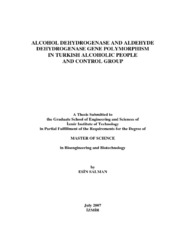Please use this identifier to cite or link to this item:
https://hdl.handle.net/11147/3851Full metadata record
| DC Field | Value | Language |
|---|---|---|
| dc.contributor.advisor | Bayraktar, Oğuz | - |
| dc.contributor.author | Salman, Esin | - |
| dc.date.accessioned | 2014-07-22T13:52:31Z | - |
| dc.date.available | 2014-07-22T13:52:31Z | - |
| dc.date.issued | 2007 | - |
| dc.identifier.uri | http://hdl.handle.net/11147/3851 | - |
| dc.description | Thesis (Master)--İzmir Institute of Technology, Biotechnology and Bioengineering, İzmir, 2007 | en_US |
| dc.description | Includes bibliographical references (leaves: 41-44) | en_US |
| dc.description | Text in English; Abstract: Turkish and English | en_US |
| dc.description | ix, 44 leaves | en_US |
| dc.description.abstract | In this study, alcohol dehydrogenase and aldehyde dehydrogenase gene, encoding alcohol metabolizing enzymes, polymorphisms were determined in alcoholic and nonalcoholic determination methods. The main objective in the study was to investigate the relationship of ADH2, ADH3 and ALDH2 gene polymorphism with the tendency of Turkish people to develop alcohol tolerance. The other significant objective was to compare polymorphism types of ADH2, ADH3 and ALDH2 seen in Turkish people and other ethnic groups or races in the world. In this present study, ADH3 genotypes of 141 alcoholic subjects, and also ADH2 and ALDH2 genotypes of 156 alcoholic subjects were assigned. The control group consisted of 80 healthy non-drinkers. Three different SNP genotyping methods were used in this study. ADH3 genotyping was performed using polymerase chain reaction-restriction fragment length polymorphism method (RFLP-PCR). ADH2 genotyping was performed by allele specific primer extension method and ALDH2 genotyping was performed by multiplex PCR by using two allele specific primer pairs. The ADH2.1 genotype was the most common type of all ADH2 genotypes in both alcoholic and non alcoholic groups. However, there was no significant difference between alcoholic and non alcoholic groups for ADH2 genotyping.ADH3 genotyping of both groups suggested that the ADH3.2 genotype frequency was higher than ADH3.1. ADH3.2 was found to be more prevalent in alcoholics compared to control group, suggesting that alcoholics were more tolerant to alcohol. In all of the alcoholic and non-alcoholic subjects examined, the frequency of ALDH2.1 was found to be 100%. Finally,it can be inferred from that obtained results, ADH2 genetic variations seem not to be related to alcoholism. On the other hand, ADH3 and ALDH2 genetic variations can make Turkish people susceptible to alcohol dependency. If all the results are taken into consideration, it is inferred that Turkish people have the inherited variations of ADH and ALDH genes which do not protect them to have alcohol sensitivity and dependency. Obtained results in the study are consistent with the white race in the world including European people but not consistent with Oriental people as expected. | en_US |
| dc.language.iso | en | en_US |
| dc.publisher | Izmir Institute of Technology | en_US |
| dc.rights | info:eu-repo/semantics/openAccess | en_US |
| dc.subject.lcc | QH462.A1 S17 2007 | en |
| dc.subject.lcsh | Genetic polymorphisms--Research | en |
| dc.subject.lcsh | Alcohols | en |
| dc.subject.lcsh | Alcohol deyhdrogenase | en |
| dc.subject.lcsh | Aldehyde deyhdrogenase | en |
| dc.title | Alcohol Dehydrogenase and Aldehyde Dehydrogenase Gene Polymorphism in Turkish Alcohololic People and Control Group | en_US |
| dc.type | Master Thesis | en_US |
| dc.institutionauthor | Salman, Esin | - |
| dc.department | Thesis (Master)--İzmir Institute of Technology, Bioengineering | en_US |
| dc.relation.publicationcategory | Tez | en_US |
| dc.identifier.wosquality | N/A | - |
| dc.identifier.scopusquality | N/A | - |
| item.openairecristype | http://purl.org/coar/resource_type/c_18cf | - |
| item.cerifentitytype | Publications | - |
| item.fulltext | With Fulltext | - |
| item.languageiso639-1 | en | - |
| item.grantfulltext | open | - |
| item.openairetype | Master Thesis | - |
| Appears in Collections: | Master Degree / Yüksek Lisans Tezleri | |
Files in This Item:
| File | Description | Size | Format | |
|---|---|---|---|---|
| T000650.pdf | MasterThesis | 1.72 MB | Adobe PDF |  View/Open |
CORE Recommender
Page view(s)
250
checked on Apr 28, 2025
Download(s)
140
checked on Apr 28, 2025
Google ScholarTM
Check
Items in GCRIS Repository are protected by copyright, with all rights reserved, unless otherwise indicated.